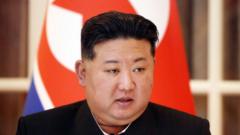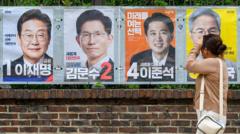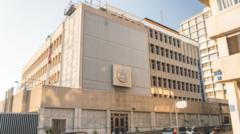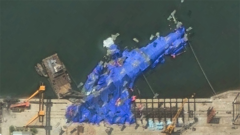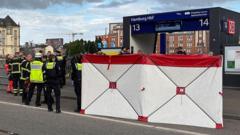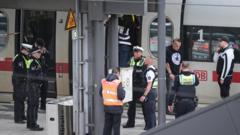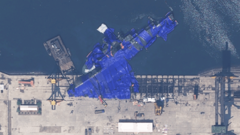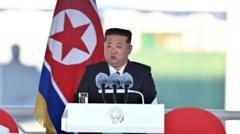The arrest of senior officials signals internal strife and the regime's ongoing commitment to military enhancement.
**North Korea's Leadership Shake-up Following Warship Launch Mishap**
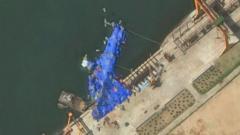
**North Korea's Leadership Shake-up Following Warship Launch Mishap**
North Korean regime takes drastic measures against officials responsible for failed military project.
North Korea has initiated a purge within its military ranks, arresting senior officials in the wake of a catastrophic warship launch failure that has drawn the ire of leader Kim Jong Un. The latest to be apprehended is Ri Hyong-son, deputy director of the Workers' Party’s Munitions Industry Department, who was deemed "largely responsible" for the mishap that involved a new 5,000-ton destroyer tipping over and sustaining hull damage in a disastrous launch.
According to state-run news agency KCNA, Kim condemned the incident as a "criminal act" that severely tarnished the nation's dignity and pride. The vessel is now under repair, overseen by a designated expert group.
The incident marks a significant level of accountability within Kim's administration, as Ri is the highest-ranking official arrested thus far. Along with him, three officials from the Chongjin shipyard—where the destroyer was constructed—have been detained, including the chief engineer, construction head, and an administrative manager. Analysts note that this unprecedented public acknowledgment of a local accident reflects a shifting dynamic within the regime.
Kim's remarks highlighted alleged "absolute carelessness" and irresponsible practices as the root causes of the failure. While it remains uncertain what consequences these officials will face, North Korea has a history of resorting to extreme punishments, including forced labor or execution, for perceived failures.
Experts suggest that the quick and harsh repercussions demonstrate Kim's intent to affirm the regime's dedication to military advancements despite setbacks. Chun In-bum, a former South Korean special forces commander, interprets this criticism from the state media as an indication of internal confidence and resilience. Michael Madden from the Stimson Center observes that the incident may stem from excessive internal pressure on personnel to deliver results rapidly.
This incident follows shortly after the unveiling of a new warship that Kim had previously hailed as a significant step in modernizing North Korea's naval capabilities, which is expected to be deployed in the near future. Such developments reinforce concerns over North Korea's ambitions in military expansion and its implications for regional security.
According to state-run news agency KCNA, Kim condemned the incident as a "criminal act" that severely tarnished the nation's dignity and pride. The vessel is now under repair, overseen by a designated expert group.
The incident marks a significant level of accountability within Kim's administration, as Ri is the highest-ranking official arrested thus far. Along with him, three officials from the Chongjin shipyard—where the destroyer was constructed—have been detained, including the chief engineer, construction head, and an administrative manager. Analysts note that this unprecedented public acknowledgment of a local accident reflects a shifting dynamic within the regime.
Kim's remarks highlighted alleged "absolute carelessness" and irresponsible practices as the root causes of the failure. While it remains uncertain what consequences these officials will face, North Korea has a history of resorting to extreme punishments, including forced labor or execution, for perceived failures.
Experts suggest that the quick and harsh repercussions demonstrate Kim's intent to affirm the regime's dedication to military advancements despite setbacks. Chun In-bum, a former South Korean special forces commander, interprets this criticism from the state media as an indication of internal confidence and resilience. Michael Madden from the Stimson Center observes that the incident may stem from excessive internal pressure on personnel to deliver results rapidly.
This incident follows shortly after the unveiling of a new warship that Kim had previously hailed as a significant step in modernizing North Korea's naval capabilities, which is expected to be deployed in the near future. Such developments reinforce concerns over North Korea's ambitions in military expansion and its implications for regional security.

